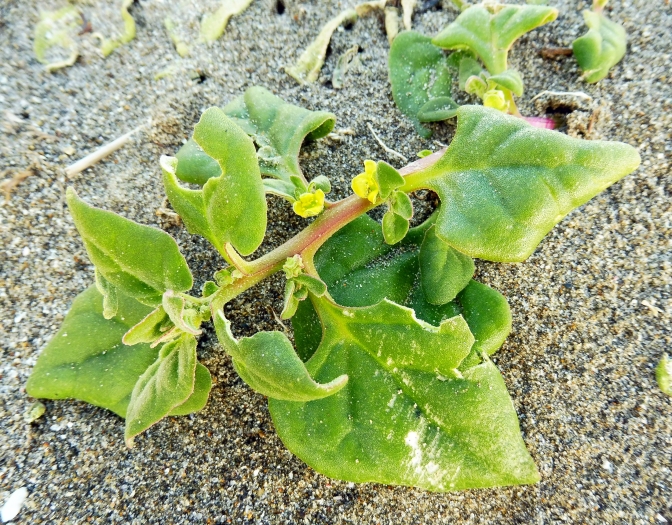New Zealand Spinach
(Tetragonia tetragonioides)
New Zealand Spinach (Tetragonia tetragonioides)
/
/

Mason Brock (Masebrock)
Public domain
Image By:
Mason Brock (Masebrock)
Recorded By:
Copyright:
Public domain
Copyright Notice:
Photo by: Mason Brock (Masebrock) | License Type: Public domain | License URL: https://creativecommons.org/public-domain/ | Uploader: Masebrock | Publisher: Wikimedia Commons | Title: Tetragonia_tetragonioides.jpg | Notes: {{Information |description ={{en|1=Teucrium cossonii ssp majoricum in bloom, Garden in Palo Alto}} |date =6/8/2020 |source =own work |author =Peter D. Tillman |permission ={{cc-by-sa-2.0}} }} [[Category:Elizabeth F. Gamble Garden]] [[Category:Files upl





























Estimated Native Range
Summary
Tetragonia tetragonioides, commonly known as New Zealand Spinach, is an annual or perennial herb that is native to coastal dunes and sandy shores in New Zealand and Australia, as well as seaside cliffs and rocky outcrops in Japan. It is well adapted to saline conditions and thrives in full sun. This plant typically forms a dense ground cover with a trailing habit, reaching heights of 2 inches (5 cm) with a spread of up to 3 feet (1 meter). The fleshy, triangular leaves are 3–15 cm long, bright green, and covered with tiny papillae that give them a glistening appearance. The inconspicuous yellow flowers bloom in summer, followed by small, horned capsules containing seeds.
New Zealand Spinach is valued for its heat and drought tolerance, making it an excellent choice for xeriscaping and coastal gardens. It is also used as a leafy green vegetable, similar to spinach, and can be eaten raw or cooked. The plant requires minimal maintenance once established and is a good option for ground cover or as an ornamental foliage plant in borders. It prefers well-drained soils and can tolerate poor fertility. Cultivation requires soaking the seeds before planting and ensuring they are spaced adequately. While it self-seeds readily, gardeners should be aware of its potential to become invasive in certain regions, such as California, and take precautions to prevent unwanted spread.CC BY-SA 4.0
New Zealand Spinach is valued for its heat and drought tolerance, making it an excellent choice for xeriscaping and coastal gardens. It is also used as a leafy green vegetable, similar to spinach, and can be eaten raw or cooked. The plant requires minimal maintenance once established and is a good option for ground cover or as an ornamental foliage plant in borders. It prefers well-drained soils and can tolerate poor fertility. Cultivation requires soaking the seeds before planting and ensuring they are spaced adequately. While it self-seeds readily, gardeners should be aware of its potential to become invasive in certain regions, such as California, and take precautions to prevent unwanted spread.CC BY-SA 4.0
Plant Description
- Plant Type: Subshrub, Herb
- Height: 1-2 feet
- Width: 3-4 feet
- Growth Rate: Rapid
- Flower Color: Yellow
- Flowering Season: Summer
- Leaf Retention: Evergreen
Growth Requirements
- Sun: Full Sun
- Water: Medium
- Drainage: Slow, Medium
Common Uses
Drought Tolerant, Edible*Disclaimer: Easyscape's listed plant edibility is for informational use. Always verify the safety and proper identification of any plant before consumption., Groundcover, Low Maintenance, Street Planting
Natural Habitat
Native to coastal dunes and sandy shores in New Zealand and Australia, as well as seaside cliffs and rocky outcrops in Japan
Other Names
Common Names: New Zealand-Spinach, Nieuwzeelandse Spinazie
Scientific Names: , Tetragonia tetragonioides, Demidovia tetragonioides,
GBIF Accepted Name: Tetragonia tetragonioides (Pallas) Kuntze